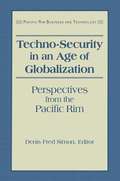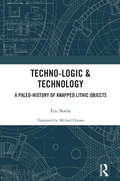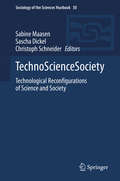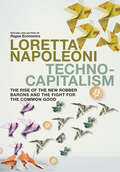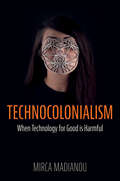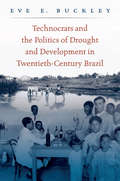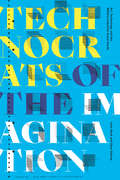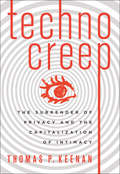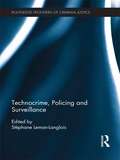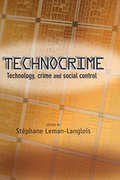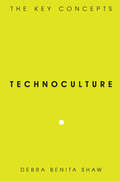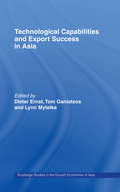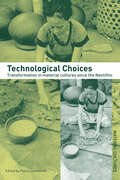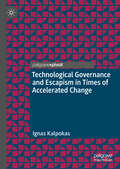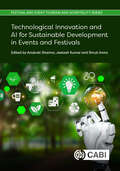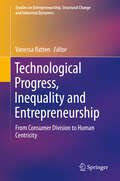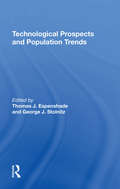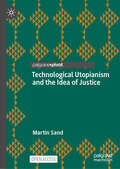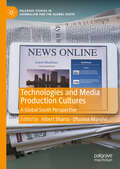- Table View
- List View
Techno-Magism: Media, Mediation, and the Cut of Romanticism (Lit Z)
by Orrin N. WangShortlisted, Marilyn Gaull Book AwardTechno-Magism explores how British Romantic literature abuts and is organized around both print and non-print media. The book explores not only the print, pictorial art, and theater of early nineteenth-century England and Europe but also communicative technologies invented after the British Romantic period, such as photography, film, video, and digital screens. This proleptic abutting points to one way we can understand the implicit exceptionality wagered by reading Romanticism through media studies and media theory.Techno-Magism argues that both media studies and the concept of mediation in general can benefit from a more robust confrontation with, or recovery of, the arguments of deconstruction, an unavoidable consequence of thinking about the relationship between Romanticism and media. The book thinks that relationship through the catachrestic practice of a techno-magism, a technics of inscription always outside the causalities of a dialectical economy. The book further pursues two interrelated ideas: the structural incommensurability of the cut and the unapologetic presentism of the constellation. Marked by its late capitalist moment of composition, the book explores the continuity between the social character of Romantic and post-Romantic media, in terms of commodity culture, revolution, and the ecological devastation of the anthropocene.
Techno-Orientalism
by Jinny Huh Catherine Fung Abigail De Kosnik Seo-Young Chu Dylan Yeats Kathryn Allan Julie Ha Tran Aimee Bahng Jason Crum Tzarina T. Prater Douglas S. Ishii Greta A. Niu Kenneth Hough Betsy Huang Se Young Kim Warren Liu Victor Bascara David S. Roh Steve Choe Charles ParkWhat will the future look like? To judge from many speculative fiction films and books, from Blade Runner to Cloud Atlas, the future will be full of cities that resemble Tokyo, Hong Kong, and Shanghai, and it will be populated mainly by cold, unfeeling citizens who act like robots. Techno-Orientalism investigates the phenomenon of imagining Asia and Asians in hypo- or hyper-technological terms in literary, cinematic, and new media representations, while critically examining the stereotype of Asians as both technologically advanced and intellectually primitive, in dire need of Western consciousness-raising. The collection's fourteen original essays trace the discourse of techno-orientalism across a wide array of media, from radio serials to cyberpunk novels, from Sax Rohmer's Dr. Fu Manchu to Firefly. Applying a variety of theoretical, historical, and interpretive approaches, the contributors consider techno-orientalism a truly global phenomenon. In part, they tackle the key question of how these stereotypes serve to both express and assuage Western anxieties about Asia's growing cultural influence and economic dominance. Yet the book also examines artists who have appropriated techno-orientalist tropes in order to critique racist and imperialist attitudes. Techno-Orientalism is the first collection to define and critically analyze a phenomenon that pervades both science fiction and real-world news coverage of Asia. With essays on subjects ranging from wartime rhetoric of race and technology to science fiction by contemporary Asian American writers to the cultural implications of Korean gamers, this volume offers innovative perspectives and broadens conventional discussions in Asian American Cultural studies.
Techno-Security in an Age of Globalization: Perspectives from the Pacific Rim (Pacific Rim Business And Technology Ser.)
by Denis Fred SimonThis text assesses the changing dimensions of national security in a world where business and technology issues have moved to centre stage, and traditional military security issues seem to have receded due to the end of the Cold War.
Techno-logic & Technology: A Paleo-history of Knapped Lithic Objects
by Éric BoëdaTechno-logic & Technology is an ambitious effort to develop a new framework for studying the development of stone tool technology, with the goal of integrating humanity’s earliest and longest-lasting technology into a comprehensive questioning of the interaction between humanity and the material world. Michael Chazan provides a translation of Éric Boëda's authoritative work Techno-logique and Technologie, which draws on the latter's career of research on stone tool assemblages from archaeological sites in Europe, the Middle East, China, and South America, together with a theoretical apparatus influenced by the work of Gilbert Simondon. This book presents a major challenge to all archaeologists studying ancient technology to reconsider how they think about artifacts and how to approach the question of progress through time in human technology. Lithic analysis is a highly empirical field of study that rarely has an impact on issues of broad theoretical interest, and Boëda’s book is a welcome exception. As well as providing contextualising information within the text, the translator Michael Chazan, himself a Paleolithic archaeologist specializing in stone tool technology, includes an interview with the author to help equip the reader to engage with this challenging text. Chiming with the growth of interest in the work of Gilbert Simondon in the English-speaking world, this book is an important resource for Palaeolithic archaeologists and lithic specialists. It will also be of interest to researchers in material culture studies, technology studies, and human evolution.
TechnoScienceSociety: Technological Reconfigurations of Science and Society (Sociology of the Sciences Yearbook #30)
by Christoph Schneider Sabine Maasen Sascha DickelThis book introduces the term of TechnoScienceSociety to focus on the ongoing technological reconfigurations of science and society. It aspires to use the breadth of Science and Technology Studies to perform a critical diagnosis of our contemporary culture. Instead of constructing technology as society’s “other”, the book sets out to highlight the both complex and ambivalent entanglements of technologies, sciences and socialities. It provides some tentative steps towards a diagnosis of a society in which individuals and organizations address themselves, their pasts, presents, futures, hopes and problems in technoscientific modes. Technosciences redesign matter, life, self and society. However, they do not operate independently: Technoscientific practices are deeply socially and culturally constituted. The diverse contributions highlight the ongoing technological reconfigurations of rationalities, infrastructures, modes of governance, and publics. The book aims to inspire scholars and students to think and analyze contemporary conditions in new ways drawing on, and expanding, the toolkits of Science and Technology Studies.
Technocapitalism: The Rise of the New Robber Barons and the Fight for the Common Good
by Loretta NapoleoniA fascinating look at how the Space Barons and Techtitans—heads of companies like Uber, Amazon, Tesla—have hijacked technology, preventing it from being used on behalf of the common good and profiting from the politics of fear and consumerism.The respected Italian economist and journalist offers a bold and provocative argument that the speed of technological transformation is threatening our futureAt the dawn of the digital revolution, the internet was going to be the great equalizer, a global democratic force. Instead, with the money printed electronically to bail out banks, Wall Street ended up funding a new breed of serial capitalists, the Techtitans, who embraced rapid, transformational change while stripping their workers of rights and enriching themselves beyond anybody&’s wildest imagination; and the Space Barons, who mine new frontiers for precious resources. Then came the gig-economy, another supposed digital equalizer, where everybody was his or her own boss, but it was just another illusion.Tech pioneers like Google, Facebook, Apple, Uber, and Microsoft never had any intention of spreading democracy. Those who control and own the technology are the absolute masters. As artificial intelligence enters the labor market, companies like Uber are able to cut labor costs to the barest of minimums, by squeezing workers&’ privileges and rights. In Technocapitalism, Napoleoni describes these phenomena as the genesis of a new paradigm, born in a period of extraordinary change in which the acceleration of transformational change has caused a dizzying, anxiety-induced paralysis from the FTX collapse to AI, private space companies to the war in Ukraine, from inflation to the dirty environmental truth of EV car batteries. Technological transformation is occurring at a speed that is existentially unbearable for most of us. We must fight for our common good to address today&’s real challenges of global warming and militarism and the soulessness of capitalist endeavor. Napoleoni shows us how.
Technocolonialism: When Technology for Good is Harmful
by Mirca MadianouWith over 300 million people in need of humanitarian assistance, and with emergencies and climate disasters becoming more common, AI and big data are being championed as forces for good and as solutions to the complex challenges of the aid sector. This book argues, however, that digital innovation engenders new forms of violence and entrenches power asymmetries between the global South and North. Madianou develops a new concept, technocolonialism, to capture how the convergence of digital developments with humanitarian structures, state power and market forces reinvigorates and reshapes colonial legacies. The concept of technocolonialism shifts the attention to the constitutive role that digital infrastructures, data and AI play in accentuating inequities between aid providers and people in need. Drawing on ten years of research on the uses of digital technologies in humanitarian operations, the book examines a range of practices: from the normalization of biometric technologies and the datafication of humanitarian operations to experimentation in refugee camps, which are treated as laboratories for technological pilots. In so doing, the book opens new ground in the fields of humanitarianism and critical AI studies, and in the debates in postcolonial studies, by highlighting the fundamental role of digital technologies in reworking colonial genealogies.
Technocrats and the Politics of Drought and Development in Twentieth-Century Brazil
by Eve E. BuckleyEve E. Buckley's study of twentieth-century Brazil examines the nation's hard social realities through the history of science, focusing on the use of technology and engineering as vexed instruments of reform and economic development. Nowhere was the tension between technocratic optimism and entrenched inequality more evident than in the drought-ridden Northeast sertao, plagued by chronic poverty, recurrent famine, and mass migrations. Buckley reveals how the physicians, engineers, agronomists, and mid-level technocrats working for federal agencies to combat drought were pressured by politicians to seek out a technological magic bullet that would both end poverty and obviate the need for land redistribution to redress long-standing injustices. Scientists planned and oversaw huge projects including dam construction, irrigation for small farmers, and public health initiatives. They were, Buckley shows, sincerely determined to solve the drought crisis and improve the lot of poor people in the sertao. Over time, however, they came to the frustrating realization that, despite technology's tantalizing promise of an apolitical means to end poverty, political collisions among competing stakeholders were inevitable. Buckley's revelations about technocratic hubris, the unexpected consequences of environmental engineering, and constraints on scientists as agents of social change resonate with today's hopes that science and technology can solve society's most pressing dilemmas, including climate change.
Technocrats and the Politics of Drought and Development in Twentieth-Century Brazil
by Eve E. BuckleyEve E. Buckley’s study of twentieth-century Brazil examines the nation’s hard social realities through the history of science, focusing on the use of technology and engineering as vexed instruments of reform and economic development. Nowhere was the tension between technocratic optimism and entrenched inequality more evident than in the drought-ridden Northeast sertão, plagued by chronic poverty, recurrent famine, and mass migrations. Buckley reveals how the physicians, engineers, agronomists, and mid-level technocrats working for federal agencies to combat drought were pressured by politicians to seek out a technological magic bullet that would both end poverty and obviate the need for land redistribution to redress long-standing injustices.
Technocrats of the Imagination: Art, Technology, and the Military-Industrial Avant-Garde (a Cultural Politics book)
by John Beck Ryan BishopIn Technocrats of the Imagination John Beck and Ryan Bishop explore the collaborations between the American avant-garde art world and the military-industrial complex during the 1960s, in which artists worked with scientists and engineers in universities, private labs, and museums. For artists, designers, and educators working with the likes of Bell Labs, the RAND Corporation, and the Los Angeles County Museum of Art, experiments in art and technology presaged not only a new aesthetic but a new utopian social order based on collective experimentation. In examining these projects' promises and pitfalls and how they have inspired a new generation of collaborative labs populated by artists, engineers, and scientists, Beck and Bishop reveal the connections between the contemporary art world and the militarized lab model of research that has dominated the sciences since the 1950s.
Technocreep
by Thomas P. Keenan"Technology is rapidly moving into our bodies," writes cyber expert Keenan, "and this book gives a chilling look ahead into where that road may lead us - on a one way trip to the total surrender of privacy and the commoditization of intimacy." Here is the definitive dissection of privacy-eroding and life-invading technologies, coming at you from governments, corporations, and the person next door.Take, for example, "Girls Around Me": a Russian-made iPhone App that allowed anyone to scan the immediate vicinity for girls and women who checked in on Foursquare and had poorly secured Facebook profiles. It combined this information in a way never intended by the original poster. Going to a Disney theme park? Your creepy new "MagicBand" will alert Minnie Mouse that you're on the way and she'll know your kid's name when you approach her. Thinking about sending your DNA off to Ancestry.com for some "genetic genealogy"? Perhaps you should think again: your genetic information could be used against you.With security scares like the Heartbleed bug (which compromised even supposedly safe internet behemoths like Google and Yahoo!) becoming more commonplace, this book is a must-read for anybody who values their privacy in a wired world.
Technocrime, Policing and Surveillance (Routledge Frontiers of Criminal Justice)
by Stéphane Leman-LangloisThe growth of technology allows us to imagine entirely new ways of committing, combating and thinking about criminality, criminals, police, courts, victims and citizens. Technology offers not only new tools for committing and fighting crime, but new ways to look for, unveil, label crimes and new ways to know, watch, prosecute and punish criminals. This book attempts to disentangle the realities, the myths, the politics, the theories and the practices of our new, technology-assisted, era of crime and policing. Technocrime, policing and surveillance explores new areas of technocrime and technopolicing, such as credit card fraud, the use of DNA and fingerprint databases, the work of media in creating new crimes and new criminals, as well as the "proper" way of doing policing, and the everyday work of police investigators and intelligence officers, as seen through their own eyes. These chapters offer new avenues for studying technology, crime and control, through innovative social science methodologies. This book builds on the work of Leman-Langlois’ last book Technocrime, and brings together fresh perspectives from eminent scholars to consider how our relationship with technology and institutions of social control are being reframed, with particular emphasis on policing and surveillance. Technocrime, policing and surveillance will be of interest to those studying criminal justice, policing and the sociology of surveillance as well as practitioners involved with the legal aspects of law enforcement technologies, , domestic security government departments and consumer advocacy groups.
Technocrime: Technology, Crime and Social Control
by Stéphane Leman-LangloisThis book is concerned with the concept of 'technocrime'. The term encompasses crimes committed on or with computers - the standard definition of cybercrime - but it goes well beyond this to convey the idea that technology enables an entirely new way of committing, combating and thinking about criminality, criminals, police, courts, victims and citizens. Technology offers, for example, not only new ways of combating crime, but also new ways to look for, unveil, and label crimes, and new ways to know, watch, prosecute and punish criminals. Technocrime differs from books concerned more narrowly with cybercrime in taking an approach and understanding of the scope of technology's impact on crime and crime control. It uncovers mechanisms by which behaviours become crimes or cease to be called crimes. It identifies a number of corporate, government and individual actors who are instrumental in this construction. And it looks at the beneficiaries of increased surveillance, control and protection as well as the targets of it. Chapters in the book cover specific technologies (e.g. the use of CCTV in various settings; computers, hackers and security experts; photo radar) but have a wider objective to provide a comparative perspective and some broader theoretical foundations for thinking about crime and technology than have existed hitherto. This is a pioneering book which advances our understanding of the relationship between crime and technology, drawing upon the disciplines of criminology, political science, sociology, psychology, anthropology, surveillance studies and cultural studies.
Technoculture and Critical Theory: In the Service of the Machine? (Routledge Studies in Science, Technology and Society #5)
by Simon CooperThe author explores the work of major thinkers and cultural movements that have grappled with the complex relationship between technology, politics and culture. Subjects such as the Internet, cloning, warfare, fascism and Virtual Reality are placed within a broad theoretical context which explores how humanity might, through technology, establish a more ethical relationship with the world.Examining the philosophy of writers such as Heidegger, Benjamin, Lyotard, Virilio, and Zizek, and cultural movements such as Italian Futurism, this book marks a timely intervention in critical theory debates. The broad scope of the book will be of vital interest to those in the fields of philosophy, critical theory, cultural studies, politics and communications.
Technoculture: The Key Concepts (The\key Concepts Ser.)
by Debra Benita ShawWe live in a world where science and technology shape the global economy and everyday culture, where new biotechnologies are changing what we eat and how we can reproduce, and where email, mobiles and the internet have revolutionised the ways we communicate with each other and engage with the world outside us.Technoculture: The Key Concepts explores the power of scientific ideas, their impact on how we understand the natural world and how successive technological developments have influenced our attitudes to work, art, space, language and the human body. Throughout, the lively discussion of ideas is illustrated with provocative case studies - from biotech foods to life-support systems, from the Walkman and iPod to sex and cloning, from video games to military hardware. Designed to be both provocative and instructive, Technoculture: The Key Concepts outlines the place of science and technology in today's culture.
Technological Capabilities and Export Success in Asia (Routledge Studies in the Growth Economies of Asia)
by Dieter Ernst Tom Ganiatsos Lynn MytelkaWhat accounts for export success? A team of international contributors show that learning and capability formation are critical to sustain competitiveness. Through a series of case studies of firms in the textile and garment and electronics industries of five Asian economies - Korea, Taiwan, Thailand, Indonesia and Vietnam - Technological Capabilities and Export Success in Asia demonstrates that cheap labour, combined with currency devaluation, is no longer sufficient for export success.
Technological Choices: Transformation in Material Cultures Since the Neolithic (Material Cultures)
by Pierre LemonnierTechnological Choices applies the critical tools of archaeology to the subject of technology and its impact on humankind throughout the ages. An examination of the challenges technological innovations present to various cultures, Technological Choices asserts that in any society, such choices are made on the basis of cultural values and social relations, rather than on the inherent benefits in technology itself. Of course, this revolutionary viewpoint has critical implications for contemporary Western societies. Based on case studies covering a wide range of chronologies and geographies, Technological Choices moves rapidly from Neolithic Europe to the modern industrial age, stopping on the way to examine the tribes of Papua, New Guinea, rural Indian and North African societies as well as several European peasant communities. The techniques studied range from the manufacture of stone implements to the development of high-tech transportation devices. With its breadth of subject matter and multidisciplinary approach, Technological Choices offers new insight into the interrelationship between technology and society. Also unprecedented is the book's emphasis on the functional aspects of material culture.
Technological Governance and Escapism in Times of Accelerated Change (Information Technology and Global Governance)
by Ignas KalpokasThis book examines escapist coping strategies brought about by the pace, breadth and governance of technological change. It argues that escapism manifests in various forms, ranging from nostalgia for a fantasised past of unhindered reason and agency, to progressive visions of societal and political improvement, and greater empowerment. Drawing on post-humanist theory and critical disability studies, the book also assesses how escapism should not be viewed as an unavoidable reaction to technological change, and develops a model for an ethically equitable relationship between humans and technology. It will appeal to all those interested in governance and politics, media and communication studies, technology studies, and philosophy.
Technological Innovation and AI for Sustainable Development in Events and Festivals (Festival and Event Tourism and Hospitality Series)
by Anukrati Sharma Jeetesh Kumar Shruti AroraFrom sustainable event planning to the influence of VR, AI, and mobile applications on tourist behaviour, this book explores the dynamic landscape where innovation meets tradition. It studies the intersection of green technologies, sustainable infrastructure, and the delicate balance between cutting-edge tools and the intrinsic emotional aspects of human engagement. Aligned with the United Nations' 17 Sustainable Development Goals, the book highlights AI's potential to drive meaningful contributions to a sustainable future. It anticipates the imminent transformation of festivals and events through technological innovation and AI implementation. It will allow the reader to gain insights into how automation streamlines logistics, optimizes marketing efforts, and enhances the overall attendee experience. The book offers readers: · A cutting-edge exploration of the transformative impact of technologies and artificial intelligence on the events and tourism industries. · Oversight of how new technology can align with the United Nations' 17 Sustainable Development Goals - readers can anticipate insights into how AI can contribute meaningfully to understanding and addressing pressing global challenges. · Practical insights for stakeholders including actionable insights that go beyond theory. It will be an essential reference for academic researchers and practitioners within events and tourism management.
Technological Progress, Inequality and Entrepreneurship: From Consumer Division to Human Centricity (Studies on Entrepreneurship, Structural Change and Industrial Dynamics)
by Vanessa RattenAlthough there have been considerable technological advances over the past decade, particularly in terms of mobile applications, much remains unknown about their effect on societal progress. This book focuses on how inequality and entrepreneurship are both by-products of technological change. The book provides insights into how society has shifted from consumer division to human centricity, and helps readers gain a better understanding of the positive and negative effects of entrepreneurship.
Technological Prospects And Population Trends
by Thomas J Espenshade George J StolnitzThe world’s population is now estimated at over 5 billion, and projections call for a continued high growth rate, predominantly in the less-developed countries. Concern over the consequences of this situation has led to numerous public policy debates, and the complex interrelationships between population and technology have become an important new topic in demographic research. The papers in this book are based on a symposium entitled “Technological Prospects and Population Trends†arranged for the 150th National Annual Meeting of the American Association for the Advancement of Science in New York City in May 1984. The book focuses on clarification of the impact that technological development and population change have on one another. For instance, how may population and related socioeconomic trends be conditioned by expected or foreseeable technological changes? What is the impact of population on technology in both the developed and newly industrializing areas of the world? Linking demography with developments in the major areas of agriculture, education, contraception, longevity, and health care, the distinguished contributors offer diverse yet integrated perspectives on what is fast becoming one of the major issues of our time.
Technological Slavery
by Theodore J. Kaczynski David Skrbina"Like many of my colleagues, I felt that I could easily have been the Unabomber's next target. He is clearly a Luddite, but simply saying this does not dismiss his argument. . . . As difficult as it is for me to acknowledge, I saw some merit in the reasoning in [Kaczynski's writing]. I started showing friends the Kaczynski quote from Ray Kurzweil's The Age of Spiritual Machines; I would hand them Kurzweil's book, let them read the quote, and then watch their reaction as they discovered who had written it." -- Bill Joy, founder of Sun Microsystems, in "Why the Future Doesn't Need Us," Wired magazineTheodore J. Kaczynski has been convicted for illegally transporting, mailing, and using bombs, resulting in the deaths of three people. He is now serving a life sentence in the supermax prison in Florence, Colorado.The ideas and views expressed by Kaczynski before and after his capture raise crucial issues concerning the evolution and future of our society. For the first time, the reader will have access to an uncensored personal account of his anti-technology philosophy, which goes far beyond Unabomber pop culture mythology.Feral House does not support or justify Kaczynski's crimes, nor does the author receive royalties or compensation for this book. It is this publisher's mission, as well as a foundation of the First Amendment, to allow the reader the ability to discern the value of any document.David Skrbina, who wrote the introduction, teaches philosophy at the University of Michigan, Dearborn.
Technological Utopianism and the Idea of Justice
by Martin SandThis open access book advances a modest defence of technological utopias. While technological utopianism is not devoid of risks and elitism, their benefits should not be discounted in an overall assessment. Rather than rejecting them based on a too narrow definition of utopianism, we must acknowledge their potential to exceed the individualist vs. collectivist dichotomy ascribed to traditional utopias. The author argues, with reference to Rawls’ idea of the basic structure that technological utopias challenge our understanding of the scope and location of justice and, thereby, advance the idea of justice. The book critically reviews the most recent literature in political philosophy, where utopias are understood as ideal theories of justice and sides with recent contributions to Utopian Studies, where utopias’ potential to estrange from the present and galvanize action are underscored.
Technologie, sozialer Wandel und menschliches Verhalten: Einfluss für Wirkung
by Cornelia C. WaltherDieses Buch befasst sich mit dem organischen Kontinuum, das Individuen, Gemeinschaften und die Gesellschaft miteinander verbindet. Ein Überblick über Aspirationelle Algorithmen (AA) und Wertvolle Werkzeuge (WW) illustriert den möglichen Nutzen von Technologie, um einen bewussten Übergang einzuleiten, vom KI-Kult zur Kultivierung von Höherer Humanität (HH). Die menschliche Einstellung, die hinter dem Design und der Nutzung von Technologie steht, bestimmt die Ergebnisse der Technologie. Wenn das angestrebte Ergebnis das Gemeinwohl ist, dann muss das vorausgehende menschliche Streben auf dieses Ziel ausgerichtet sein. Nur eine Technologie, die mit dem Ziel konzipiert wurde, eine Gesellschaft zu schaffen die den Einzelnen zur Entfaltung seines Potenzials befähigt, wirkt sich positiv auf das Gemeinwohl aus. Angesichts des ständigen Wechselspiels zwischen den vier Dimensionen der menschlichen Existenz - Seele, Herz, Verstand, Körper -, die sich in Form von Bestrebungen, Emotionen, Gedanken und Empfindungen ausdrücken, wird deutlich, wie Technologie dazu dienen kann, den Einzelnen systematisch von der Inspiration zum Wunsch, von der Information zur Zündung einer spürbaren Veränderung zu führen. Dieses Buch erklärt den Übergang entlang einer multidimensionalen Einfluss Skala. Zwei sich gegenseitig beeinflussende Dynamiken werden analysiert: erstens der Einfluss von Werten und Bestrebungen auf die Wirkung von Technologie und zweitens der Einfluss von Technologie auf die Einstellung und das Handeln der Nutzer. Beide Ansätze zielen darauf ab, zu bewerten wie Hard- und Software einem Maximum an Menschen zu einem sinnvollen, glücklichen Leben verhelfen können.
Technologies and Media Production Cultures: A Global South Perspective (Palgrave Studies in Journalism and the Global South)
by Ufuoma Akpojivi Albert SharraThis volume delves into the intricate relationship between technology and media production, emphasizing its influence across political, socio-economic, and cultural contexts. By 2010, the integration of computing and automated systems had already begun revolutionizing media production, prompting traditional outlets to embrace a 'digital first' approach. Concepts like dual-management processes and the fusion of traditional and digital systems have emerged, challenging conventional norms. What sets this transformation apart is the gradual replacement of human decision-making with communicative artificial intelligence and automation. Technology now plays a central role in producing and distributing news and Ads, fundamentally altering the media landscape. However, there has been limited exploration of the broader implications of these advancements, particularly from the perspective of the Global South. This edited volume seeks to address this gap by featuring papers that examine how technology has reshaped newsroom and advertorial processes in countries like Malawi, South Africa, and Nigeria. Through a collection of insightful essays, readers are invited to explore the transformative power of technology in media production, packaging, and distribution systems. From digital innovations to traditional media adaptations, this volume offers a comprehensive understanding of the evolving media landscape in the age of technology.


